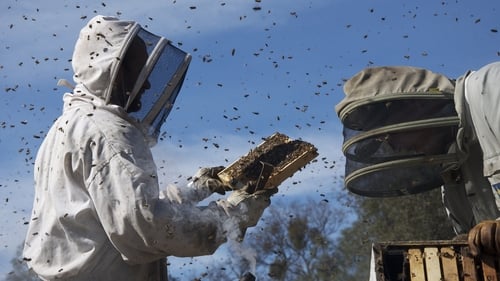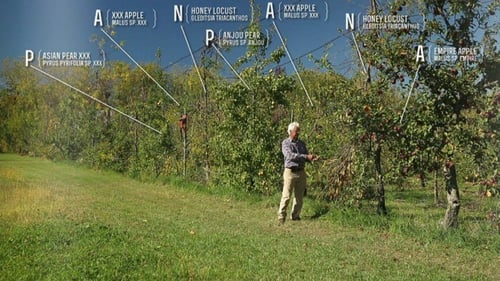In Grave Danger of Falling Food (1992)
In this introductory video to permaculture, Bill Mollison, the movement’s co-founder, takes the viewer through the history and developments of the movement.
장르 : 다큐멘터리
상영시간 : 0분
시놉시스
In this introductory video to permaculture, Bill Mollison, the movement’s co-founder, takes the viewer through the history and developments of the movement. With startlingly laconic humor and insight he deconstructs the modern agribusiness and the “modern plague” : manicured ornamental lawns. In this video he offers an antidote, which is an antidote to both our currently unsustainable practices and our unsustainable culture. Both of these have to change and adapt. Permanently.

With dazzling nature photography, Academy Award®–nominated director Markus Imhoof (The Boat Is Full) takes a global examination of endangered honeybees — spanning California, Switzerland, China and Australia — more ambitious than any previous work on the topic.

An outcast in his community, Farmer John bravely stands amidst a failing economy, vicious rumors, and violence. By melding the traditions of family farming with the power of art and free expression, this powerful story of transformation and renewal heralds a resurrection of farming in America. Through highly personal interviews and 50 years of beautifully textured footage, filmmaker Taggart Siegel shares Farmer John’s haunting and humorous odyssey, capturing what it means to be wildly different in a rural community.

At the focal point of this movement, and of this film, are the farmers and chefs who are creating a truly sustainable food system. Their collaborative work has resulted in great tasting food and an explosion of consumer awareness about the benefits of eating local. Attention being paid to the local food movement comes at a time when the failings of our current industrialized food system are becoming all too clear. For the first time in history, our children's generation is expected to have a shorter lifespan than our own. The quality, taste and nutritional value of the food we eat has dropped sharply over the last fifty years. Shipped from ever-greater distances, we have literally lost sight of where our food comes from and in the process, we've lost a vital connection to our local community and to our health.

Inhabit is a feature length documentary introducing permaculture: a design method that offers an ecological lens for solving issues related to agriculture, economics, governance, and on. The film presents a vast array of projects, concepts, and people, and it translates the diversity of permaculture into something that can be understood by an equally diverse audience. For those familiar, it will be a call to action and a glimpse into what's possible - what kind of projects and solutions are already underway. For those unfamiliar, it will be an introduction to a new way of being and a new way of relating to the Earth. For everyone, it will be a reminder that humans are capable of being planetary healing forces.

In 1923, Rudolf Steiner, an Austrian scientist, philosopher & social innovator, predicted that in 80 to 100 years honeybees would collapse. Now, beekeepers around the United States and around the world are reporting an incredible loss of honeybees, a phenomenon deemed "Colony Collapse Disorder." This "pandemic" is indicated by bees disappearing in mass numbers from their hives with no clear single explanation. The queen is there, honey is there, but the bees are gone. For the first time, in an alarming inquiry into the insights behind Steiner's prediction QUEEN OF THE SUN: What Are the Bees Telling Us? investigates the long-term causes behind the dire global bee crisis through the eyes of biodynamic beekeepers, commercial beekeepers, scientists and philosophers.

The story of a mom whose son healed from all allergies and asthma after consuming raw milk, and real food from farms. It depicts people all over the country who formed food co-ops and private clubs to get these foods, and how they were raided by state and local governments.

Permaculture teacher Geoff Lawton enters the intensive small space gardens in the city and looks at the way Permaculture can be used to create sustainable abundance.

This film explores food sustainability, how farmers' markets build community, and why local food matters. Filmmaker Dr. Benjamin Garner is an Associate Professor at the University of North Georgia. He produces films on food, marketing, and tourism. Dr. Garner consults with companies on soft skills training and produces video ads for web and social media.

In his new film, Erwin Wagenhofer is looking for the good and beautiful in this world.

Geoff Lawton's Urban Permaculture - Designing the Urban Garden

In this introductory video to permaculture, Bill Mollison, the movement’s co-founder, takes the viewer through the history and developments of the movement. With startlingly laconic humor and insight he deconstructs the modern agribusiness and the “modern plague” : manicured ornamental lawns. In this video he offers an antidote, which is an antidote to both our currently unsustainable practices and our unsustainable culture. Both of these have to change and adapt. Permanently.

Permaculture teacher Geoff Lawton designs and builds a dam and water harvesting system on a farm.

Geoff Lawton takes you into the world of Permaculture and explains the basic concepts for beginners.

Local, organic, and sustainable are words we associate with food production today, but 40 years ago, when Fran and Tony McQuail started farming in Southwestern Ontario, they were barely spoken. Since 1973, the McQuails have been helping to build the organic farming community and support the next generation of organic farmers. This is a documentary about the McQuails that explores the very real ways their farm has contributed to the long term ecological viability of agriculture in Ontario. It is a call to action for all those who believe there is a better way to take care of our planet and feed the world.

Geoff Lawton demonstrates how to grow a food forest from start to finish. Geoff helps get you on the right track toward growing a productive garden paradise.

We’ve all seen environmental problems highlighted everyday on the media. Now comes the solution. From the man who said, “You can solve all the world’s problems in a garden” comes Geoff Lawton’s Permaculture Soils DVD. 137 minutes of Permaculture soil creation strategies that really work! Even if you have never built a garden or got your hands dirty before, you will learn the secrets of real soil creation – partnering with the life in the Soil! Geoff will take you through every step of the process and explain in detail how to do it yourself. From Compost creation to larger Kitchen Gardens and then to broad acre farming – this is the future of biological agriculture.

Documentary that tells the story of Steiner’s remarkable life (1861-1925), as well as exploring the influence of his ideas and insights on a whole range of contemporary activities – education, agriculture, medicine, social and financial issues, and the arts. PART ONE describes Steiner’s childhood as the son of a humble railway official, growing up in the Austrian countryside, and his student years in Vienna towards the end of the 19th century. Hugely influenced by Goethe’s scientific writings, he was gradually able to reconcile the powerful spiritual experiences he had had since childhood with his interest in science and philosophy. PART TWO looks initially at the subject of reincarnation and karma, with film at a prison in South Wales, at Ruskin Mill in Gloucestershire – a college for disadvantaged youngsters. In the USA there are scenes at a biodynamic winery in California. Also featured are examples of Waldorf educational ideas being introduced into mainstream schooling.

This feature-length educational film teaches you how to set up your own permaculture orchard at virtually any scale. We recognize the limitations of the organic model as a substitute to conventional fruit growing, and want to propose a more holistic, regenerative approach based on permaculture principles. Based on 20 years of applied theory and trial and error, biologist and educator Stefan Sobkowiak shares his experience transforming a conventional apple orchard into an abundance of biodiversity that virtually takes care of itself. The concepts, techniques and tips presented in this film will help you with your own project, whether it is just a few fruit trees in your urban backyard, or a full-scale multi-acre commercial orchard.










